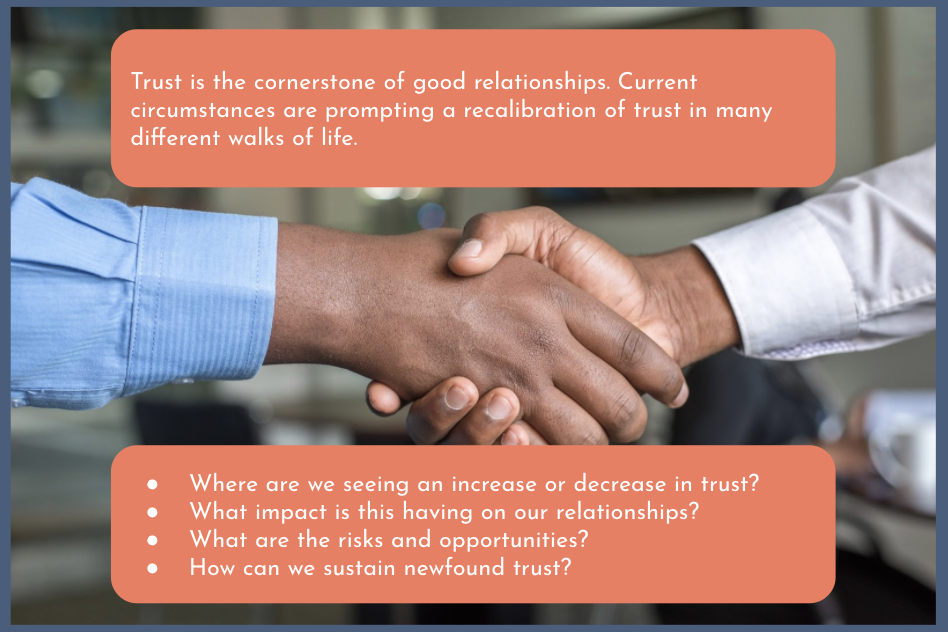In this Observatory Sighting, we explore how trust is being recalibrated and the impact this is having on relationships both now and in the future

Over the last couple of weeks we have reported on what we see on the surface: Thousands of new community groups, new collaborations across the sectors, innovative uses of technology and social media etc. Some of this is exclusively emergency provision and wouldn’t be appropriate beyond the crisis but sustaining just a small proportion into the longer term would significantly increase the readiness and resilience of our communities and the well being of some of the most disadvantaged.
Will this period result in a rebalancing or will we gradually revert to old behaviours?
Social capital surveys in the US found that trust in neighbours rose by 10% and trust in local government by 17% in the months after 9/11. Changes in behaviour were more modest but still striking with 5 to 7 percent increases in giving blood, volunteering and working on local community projects. Robert Putnam says that America turned from being a “me society” to a “we society” in the immediate wake of the attack but then, equally importantly, turned back equally sharply after six months.
Will we swing back to a ‘me society’ in 6 months time or can the shifts be sustained?
Here’s a glimpse of how it feels to be balancing trust and risk at the moment
“One elderly resident in Waltham Forest has started cooking for her neighbour. It transpires that for the last year the neighbour had been surviving only on sandwiches and this has been the first time she’s had hot food for a long time. The lady has been touched by that and it has lifted them both incredibly.”
We hear of other examples of trust – councils and independent foundations making grants to charities without the usual forms and restriction, statutory services giving discretionary budgets to staff for spending on urgent needs, again without the normal protocols and cross sector collaborations underpinned by relationships rather than contracts. Again all this involves thinking differently about risk but as Giles Gibbons CEO of Good Business told us this week “trust is now the true currency”.
What does this tell us… well at 96 I think he is happier to see a smiling face than anything else… and he and I are willing to take the risk (it helps that I am disclosure checked for other roles)… but I do worry that the one or two inevitable cases of theft (or worse) will be given more weight than the value of a human relationship at a time of deep loneliness and isolation.
And finally, our favourite story of the week
We have a traditional red phone box which has now organically become a place for swapping and dropping things to help each other and maintain social distancing during COVID… So far this week someone left a box of chocolates which were collected by a little girl who was having a rubbish birthday in isolation and someone else left some tea bags and pasta and other essentials in there and others have left books and magazines for anyone who might be struggling to get out or just needed something nice. One little girl in year 6 from the local school who wasn’t in school on the last day before they shut didn’t get her school shirt signed by her friends and was so upset. The shirt is hanging in there with some pens and all her friends are signing it on their daily walk to cheer her up.
Thanks to this week’s contributors
The Observatory is a voluntary collaboration led by the Relationships Project. We are dependent on the eyes and ears of our observers and partner organisations and we need more.
The voices heard this week include Priya Banati, Giles Gibbons, Marnie Freeman, Jessie Robinson, Nick Sinclair and the LAC Network.

This is brilliant – I have just done an interview this afternoon before reading this, where I spoke about my hopes for the future including as desire to see this culture of increased trust continue. This includes replacing the burden of proof in bureaucratic systems with relationships of trust.
It has been a frustration to both the local CVS and Council that food banks in our locality have never collaborated – some would say have actually competed! During the last 4 weeks, we have seen them come together to share excess, help with shortfall & collaborate with referrals. A Whatsapp group has now been formed so they can quickly distribute resources between them. No one ‘asked’ them to – one of the leaders just decided it was ‘crazy not to’! The focus became on the need of the residents, not the organisations.
There is an environment of collaboration and we see ‘trust’ building in that – not everywhere but in pockets – those with more baggage from the past are taking longer, understandably. It’s an important time to reset how we do things here and trust is core to building stronger relationships – stronger relationships are core to genuine partnership that focuses on what we are seeking to do – rather than worrying about who is doing it. Interesting times